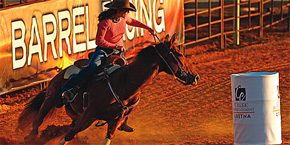Judge Issues Split Decision In Horse Track Regulatory Fight
January 30, 2016
Gambling regulators overstepped their authority with a proposed rule that would require jockeys to wear white pants and protective garb such as helmets and boots specifically designed for horse racing, an administrative law judge decided Friday.
But regulators’ proposed rule requiring horse races to begin from a box or gate and establishing minimum lengths and widths for horse tracks should stand, Administrative Law Judge E. Gary Early ruled in a 33-page order.
 The order came in a case involving Gretna Racing, a tiny Northwest Florida track operated by the Poarch Creek Indians of Atmore that received the nation’s first pari-mutuel permit for rodeo-style “barrel racing.”
The order came in a case involving Gretna Racing, a tiny Northwest Florida track operated by the Poarch Creek Indians of Atmore that received the nation’s first pari-mutuel permit for rodeo-style “barrel racing.”
The state Division of Pari-mutuel Wagering spent two years crafting the rules aimed at reining in barrel races, which were stopped by a different administrative law judge in 2013.
Regulators in 2011 granted a pari-mutuel license to Gretna Racing for the rodeo-style barrel racing, which, in turn, allowed the facility to open a more-lucrative card room. An appeals court later ruled that the state erred in granting the barrel-racing license. After the ruling, the state and Gretna Racing entered an agreement authorizing “flag drop” races in which two riders compete against each other but without any obstacles in the arena.
The proposed rules, published last summer, set up standards for track shapes and sizes and established new requirements for jockeys, aimed at barrel racers — mostly women — affiliated with the Gretna track.
The North Florida Horsemen’s Association — which represents about 200 owners, trainers and riders in the barrel racing industry linked with the Gadsden County facility — challenged the rules, resulting in Friday’s order.
The association’s lawyer, Donna Blanton, had questioned a proposal that would require all races to begin from a starting box or gate, which would put an end to “flag drop” races. The rule would impose a “significant adverse economic impact” on the riders, owners and breeders, Blanton wrote in the 44-page complaint filed last year.
The rule is designed to “appease industry participants who seek to have quarter horse racing defined in such a way that supports their form of quarter horse racing to the exclusion of all others,” Blanton argued. “The satisfaction of special interests cannot serve as a logical basis for the track rule.”
The proposed rule also established that each race must have at least five entrants with a minimum of two contestants.
Quarter horse breeders, owners and trainers affiliated with other tracks have complained about the barrel-racing and flag-drop races, which have also set the stage for the Gadsden County to potentially begin operating slot machines.
Early ruled that state law gave the agency authority “specifically tailored to the adoption of standards for racetracks, race meets, and races.”
“Without the ability to set track and race standards, the legislative authority in (the statute) would have little purpose or meaning,” he wrote.
In contrast, state law does not give the agency — a division of the Department of Business and Professional Regulation — the power to craft rules pertaining to jockeys, Early wrote.
The proposed rule required that jockeys demonstrate riding ability, including switching the riding crop from one hand to another while maintaining control of the horse in a stretch drive.
The proposed rule also required jockeys to wear white pants, “unique racing colors,” and protective vests, helmets and boots “which have been specifically designed for horse racing when riding in races or when exercising horses.”
But nothing in state law gives the agency the authority for that rule, Early wrote. Instead, the statute regarding occupational licenses only deals with information necessary to establish “the identity and good moral character of an applicant for an occupational license,” he wrote.
Representatives of the North Florida Horsemen’s Association could not immediately be reached for comment Friday.
Friday’s order is the latest in a series of rulings about state gambling regulations.
Last month, Administrative Law Judge Robert E. Meale ruled that the Division of Pari-mutuel Wagering overstepped its authority with rules that would have placed additional requirements on jai alai operators.
David Romanik, a lawyer who is a part-owner of the Gretna track, questioned Early’s decision upholding the track rule.
Romanik said that “everybody will be able to comply” with the track regulation, but he didn’t rule out an appeal.
“It’s not really the end-of-the-world type stuff. It was really more a matter of principle that, for the first time ever, the division is now starting to dictate policy to management as to how to run a private business, which is what these tracks are,” he said.
Regulators are entitled to establish rules regarding wagering, drugging of animals and the integrity of jockeys, Romanik said.
“But how big your track is and how many horses should be in the race? What does the Division of Pari-mutuel Wagering know about that? They know nothing. That’s why they’ve never regulated it before,” he said. “To me, that’s the biggest error in this ruling — now allowing the division to start regulating into an area of someone else’s private business.”
The Florida Supreme Court, meanwhile, is poised to decide whether slot machines should be allowed at the Gretna track in a case that could have wide-reaching implications.
The Supreme Court accepted jurisdiction in the Gretna Racing case after a split appellate court ruled in October that Gretna Racing cannot have slot machines without the authorization of the Legislature, even though voters in the county approved slots in a referendum.
The Supreme Court’s decision also will likely affect gambling operations in at least five other counties — Brevard, Hamilton, Lee, Palm Beach and Washington — where voters have approved authorizing slots at local pari-mutuels.



Comments